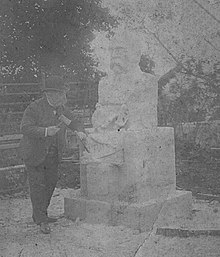Fernando Heydrich Klein (26 January 1827 – April 1, 1903) was a German businessman, politician, engineer and sculptor who lived in Matanzas, Cuba. Builder of the Aqueduct of Matanzas, he was politically engaged, playing a significant role during the Ten Years' War in Cuba.
Married to Maria-Candelaria Martínez y Valdez, he was father of American Consul Alfredo Heydrich and Emilio Heydrich; he was also an ancestor of the artists Daniel Garbade and Juan Esnard Heydrich. He died 1903 and was laid to rest at the Necropolis San Carlos Borromeo, Matanzas.
Aqueduct of Matanzas

In 1845, Manuel del Portillo successfully initiated the idea of an aqueduct for the supply of drinking water to Matanzas. Francis Albear y Lara, the engineer and chief, also encountered resistance. When Juan F. Sanchez and Bárcena also failed in a similar project, Fernando Heydrich proposed his own project together with G. Fabra and Cabanillas and his company, Heydrich & Cie, and received the order in 1870 to build a water channel from the springs of Manantial Bello y Benavides to Matanzas. They exploited the aqueduct til 1912. [1] It still stands as a landmark of the city and was chosen as a monument of the nation in 2005. [2]
Industry
Heydrich was one of the first producers of Sisal on the island. With his son Alfredo and his company Heydrich and Raffoler & Cie, he requested the patent, which he finally got after a long dispute and thus began a new kind of production in Cuba. [3]
Politics
During the insurrection of the rebels during the Ten Years' War, Fernando Heydrich played an essential role as founder and president of the Compania de Alemanes, also called the “Club Alemán”. [4] Their task was the founding of a volunteer corps / militia to protect the goods of German and other foreign merchants. He received the explicit consent from Otto von Bismarck through a telegram to Consul Luis Will, in 1869, under the condition of preserving neutrality. [5]
References
- ^ supremo, Cuba Tribunal (1910). Jurisprudencia del Tribunal Supremo (in Spanish).
- ^ "... Cultura cubana (La provincia de Matanzas y su evolución) ." archive.org. Retrieved 2017-09-08.
- ^ García, Antonio Santamaría (1900). Economía y colonia: la economía cubana y la relación con España (1765-1902) (in Spanish). Editorial CSIC - CSIC Press. ISBN 9788400090081.
- ^ Zeuske, Michael. "Deutsche Eliten in Lateinamerika (19. Jahrhundert). Regionen, Typen, Netzwerke und paradigmatische Lebensgeschichten". Denzel, Markus A.(ed.), Deutsche Eliten in Übersee (16. Bis Frühes 20. Jahrhundert). Büdinger Forschungen zur Sozialgeschichte 2004 und 2005, St. Katharinen: SCRIPTA MERCATURAE VERLAG, 2006 (Deutsche Führungsschichten in der Neuzeit; Band 27), Pp. 173-206.: 17/18.
- ^ Carreras, Sandra; Maihold, Günther (2004). Preussen und Lateinamerika: im Spannungsfeld von Kommerz, Macht und Kultur (in German). LIT Verlag Münster. ISBN 9783825863067.
